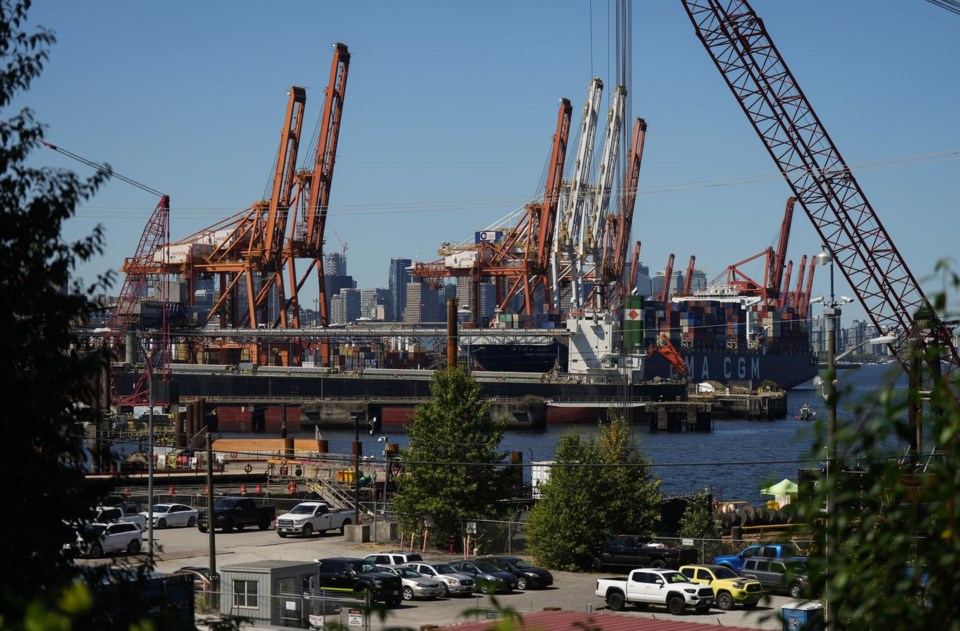VANCOUVER — An expert says a narrowly averted labour stoppage at British Columbia ports could re-emerge despite federal intervention unless the core issue of automation and its threat to union jobs is addressed.
The Canada Industrial Relations Board ordered on Sunday that the union representing ship and dock foremen at B.C. ports rescind a strike notice against DP World Canada that would have started job action on Monday.
McGill University Associate Prof. Barry Eidlin says while strike action was averted this time, the core issue of automation at the ports remains unaddressed.
The International Longshore and Warehouse Union Local 514 said in June that DP World Canada told the union it was introducing automation in the loading and unloading of cargo containers at its Centerm facility at the Port of Vancouver.
The union has been negotiating with the B.C. Maritime Employers Association on a new collective agreement, and the labour relations board ruled the strike notice was illegal because a strike vote only involved employees of DP World.
Eidlin says if the employers don't work with the union on finding a palatable solution, it would not be surprising for the local to reach a position where it's members can legally strike, which could come "in a few weeks or a few months."
"Forcing workers back to work or trying to restrain their Charter-protected right to strike is not going to resolve the underlying issues," Eidlin says.
DP World Canada referred a request for comment to its employers association, which declined to make a statement because the automation issue will be heard by the Canada Industrial Relations Board at hearings resuming on Aug. 6.
The maritime employers had issued what it called a "defensive action" in response to Local 514's strike notice, threatening to lockout all of the union's members at companies represented by the association if the strike against DP World Canada went ahead.
The industry-wide lockout notice across at B.C.'s ports was rescinded following the board's decision on the strike notice against DP World Canada.
Strike action in 2023 by thousands of workers shut down most of B.C.'s ports for 13 days, freezing billions in trade at the docks.
Eidlin says the persisting tensions at B.C. ports between employers and workers appear to be a continuation of animosity from last year's dispute between the employers and the longshore union.
Eidlin says both the strike last year and the current labour dispute have shown port employers are taking a "more aggressive" tone with the unions, which are historically willing to threaten job action and may be viewed by some as "combative."
He says if the union's allegation that DP World was "unilaterally" imposing work conditions without consulting workers is true, the local's decision to issue a strike notice may have been seen as "the only option they have available."
"These are life-or-death issues both in terms of the substance, in the sense that port automation is a core issue that is going to have dramatic effects on workers' lives … and in terms of the form, in the sense that allowing employers to implement unilateral changes in working conditions is a grave violation of core principles of how collective bargaining should work."
Liam McHugh-Russell, an assistant professor at Dalhousie University, agrees that another strike notice in the ongoing labour dispute is possible if the core questions of automation aren't addressed between employers and employees.
But he says he isn't worried about the tone of labour relations deteriorating at B.C. ports, as the strike and lockout notices are an indication that the negotiation process is working as intended.
"The union is specifically concerned about the practices of one employer, but given the structure of the bargaining relationship and the structure of the (labour code), it's not within their power to bargain or negotiate directly with that single employer," McHugh-Russell says.
"Given the issue is with one employer, it makes sense that they may give that a try," he says of the latest strike notice. "They were pushing against the boundaries of the (labour code) … and certainly, there was significant risk of disruption."
This report by The Canadian Press was first published July 9, 2024.
Chuck Chiang, The Canadian Press


